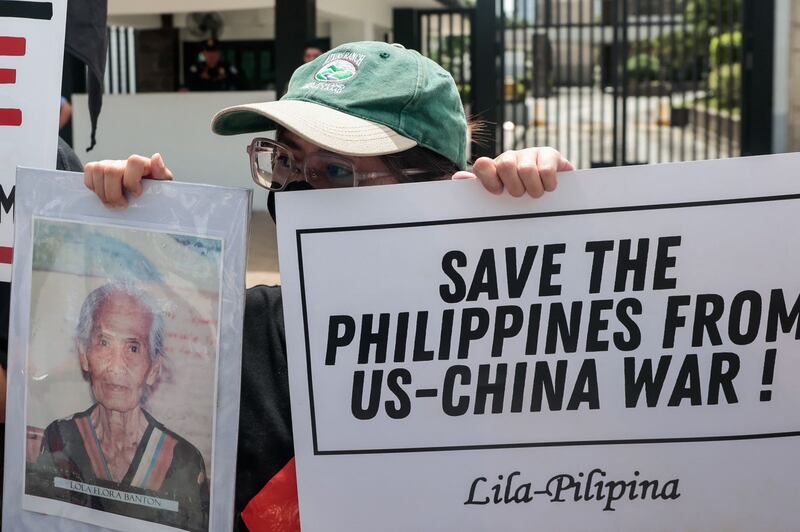The Philippine Senate may not be able to ratify a crucial defense pactwith Japan this year because it’s still waiting for government agencies to send a copy of the signed agreement, the chamber’s president warned on Tuesday.
In early July, Tokyo and Manilainked the Reciprocal Access Agreement, or RAA -- a pact which aims to bluntChina's growing assertiveness in waterways where they have territorial disputes with Beijing, although it does not mention the Asian superpower by name.
The RAA provides a framework for bilateral security operations and cooperation in military training, including joint drills and maritime patrols in South China Sea waters within the Philippines’ exclusive economic zone. The deal will also define the legal status of visiting troops.
“As of this day, we have not yet received the RAA, so how can I give you a timeline if we haven’t received the proposed treaty for ratification?” Senate President Francis Escudero said during an appearance at the Foreign Correspondents Association of the Philippines.
Once the agreement is ratified by both the Senate and President Ferdinand Marcos Jr., it will allow Japanese troops to return to Philippine soil for the first time since the Imperial Japanese Army’s occupation during World War II.
Escudero said the document was still under review by the foreign office and other relevant agencies, but he warned that time was running out to pass the treaty through the Senate.
“As soon as we get it, probably it would take us about a month to deliberate on it and put it to a vote,” he said. “So hopefully we would be able to do it within the year if they give it to us before the end of October.”
Philippine government officials did not immediately respond to requests for comment on the issue from BenarNews, an RFA-affiliated online news organization.
Under Philippine law, the country's president has the power to ratify a treaty or international agreement but the Senate, the upper house of Congress, must first concur with ratification.
First in Asia
Japan has pursued similar agreements with a handful of countries, such as the United Kingdom and Australia, but the RAA is its first bilateral defense pact with an Asian country.
The Philippines also has a pact with the U.S., the Visiting Forces Agreement, which was signed in 1999 and sets the terms under which American military personnel can operate on Philippine soil.
Japan, unlike the Philippines, does not have territorial claims that overlap with China’s expansive ones in the South China Sea. But Tokyo has a separate dispute with Beijing over a group of uninhabited Senkaku Islands (also known as the Diaoyu Islands) in the East China Sea.
The RAA is also expected to lead to "cooperative activities" between both Manila and Tokyo, including disaster relief drills, Japan's Ministry of Foreign Affairs had said.

Some Filipino activist groups, however, have opposed the signing of the pact. These include Lila Pilipina, a group representing the victims of wartime military sexual slavery by Japanese troops during World War II.
"This agreement, far from promoting peace and stability, represents a troubling resurgence of Japan's hegemonic ambitions in the region, under the baton of U.S. imperialism," Lila Pilipina and other activist groups said in a statement in July.
“It is deeply concerning that Japan seeks to expand its military presence without fully addressing and providing justice for its wartime atrocities, particularly the horrific system of comfort women that devastated countless lives across Asia,” the groups said.
China has also criticized the signing of the RAA by reiterating that bilateral cooperation should not “target” third parties.
Beijing likewise reminded Tokyo of its “aggression and colonial rule” over Manila and other Southeast Asian countries during World War II.
RELATED STORIES
[ In China’s shadow, Philippines and Japan sign groundbreaking defense pactOpens in new window ]
[ Philippines, Japan may soon sign ‘historic’ defense pactOpens in new window ]
[ Philippine, Japanese warships conduct joint exercises in South China SeaOpens in new window ]
[ Philippines, Japan boost military ties amid tensions in South China SeaOpens in new window ]
[ EXPLAINED: Sabina Shoal, the newest flashpoint in the South China SeaOpens in new window ]
Deterrence policy
Despite the delay in ratifying the RAA, a Filipino security analyst believes the defense pact would help Manila and Tokyo push back against Beijing’s maritime activities in the South China and East China seas.
“[The RAA] can be translated as a hopeful [remedy] to strengthen close security relations of the two most vocal critics of China,” said defense analyst Chester Cabalza, president of International Development and Security Cooperation, a Philippine policy think-tank.
"The gap [in the ratification of the RAA] is not yet in stalemate in spite of China's ratcheted maneuvers in [ the South China Sea]," Cabalza told BenarNews.
Jojo Riñoza in Manila contributed to this report.
BenarNews is an RFA-affiliated online news organization.
